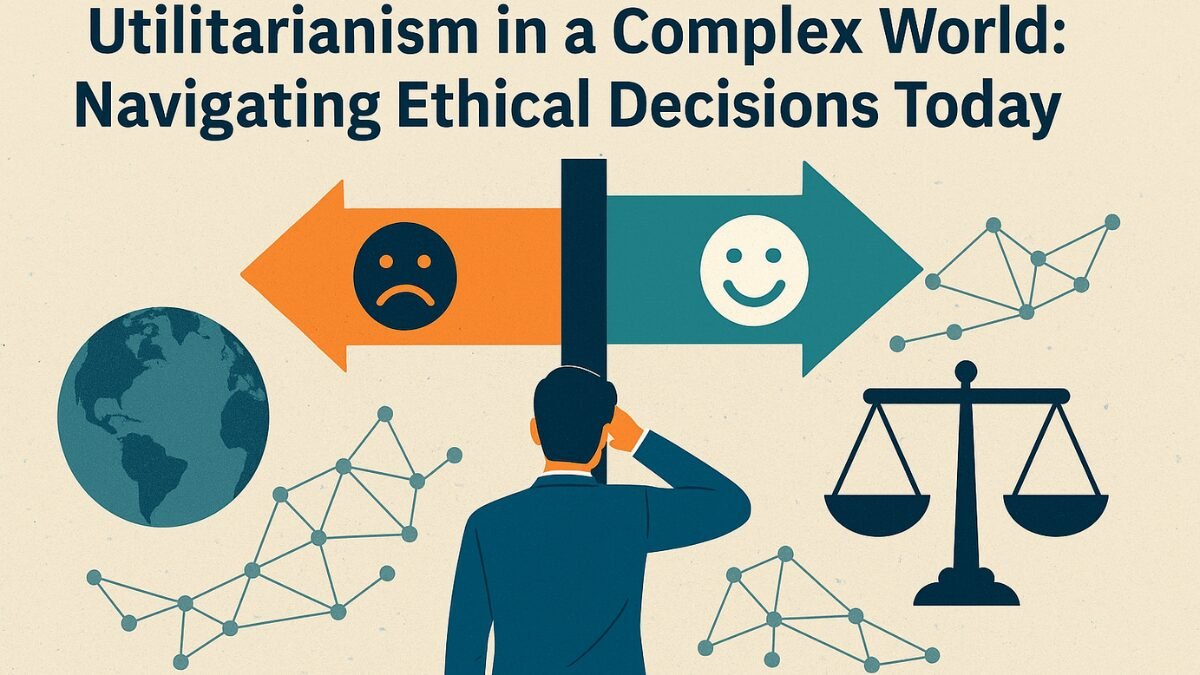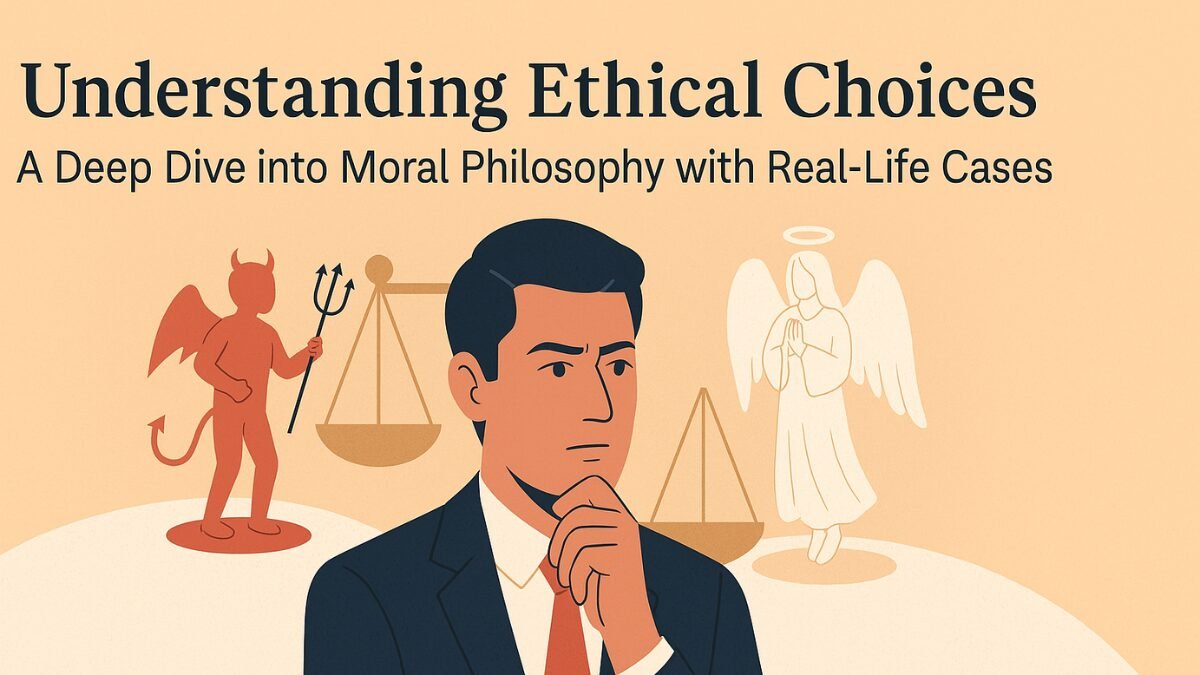Explore how utilitarianism helps navigate today’s ethical decisions in a complex world. Discover its principles, real-world applications, challenges, and practical insights.
also read: https://comfortglobalhealths.com/exploring-virtue-ethics-relevance-in-contemporary-moral-discourse/
Introduction: Understanding Utilitarianism Today
In today’s rapidly evolving world filled with diverse beliefs, digital transformations, and global challenges, making ethical decisions is more complicated than ever. Whether in politics, business, healthcare, or personal life, decision-makers constantly face moral dilemmas. Utilitarianism in a complex world: navigating ethical decisions today becomes not just a philosophical topic but a practical necessity. But how does this age-old ethical theory hold up in our intricate modern society?
This article explores how utilitarianism—based on maximizing happiness and minimizing suffering—functions in real-world situations. We’ll look at its strengths, limitations, and its relevance in areas such as public policy, technology, environmental ethics, and more.
What is Utilitarianism?
Utilitarianism is an ethical theory that suggests an action is morally right if it results in the greatest good for the greatest number of people. The theory is most often associated with philosophers Jeremy Bentham and John Stuart Mill.
At its core, utilitarianism is consequentialist, meaning the morality of an action is judged based on its outcomes, not intentions. If an action brings about more overall benefit than harm, it is considered ethically right.
There are two primary branches:
- Act Utilitarianism: Evaluates each action based on whether it produces the best consequences.
- Rule Utilitarianism: Considers whether following a certain rule generally leads to the greatest good.
Why Utilitarianism Remains Relevant in a Complex World
We live in a time where decisions have widespread and sometimes unforeseen consequences. Social media posts can influence elections, AI tools can impact employment, and medical decisions can affect millions. Utilitarianism offers a structured approach to analyze such situations by weighing the benefits and harms.
Modern Complexities That Demand Ethical Clarity
| Sector | Ethical Dilemma | Utilitarian Lens |
|---|---|---|
| Healthcare | Allocation of limited resources (e.g., organ transplants) | Maximize lives saved or quality-adjusted life years |
| Technology | Use of surveillance AI | Balance safety and privacy |
| Business | Layoffs vs. corporate survival | Minimize overall job and economic disruption |
| Environment | Climate policy decisions | Evaluate impact on current and future generations |
| Public Policy | Vaccine mandates | Consider population health vs. individual freedoms |
Utilitarianism helps simplify ethical decisions by focusing on measurable outcomes such as happiness, health, safety, and financial stability.
Utilitarianism in Public Policy and Governance
Governments often rely on utilitarian reasoning when forming policies. For instance, public health policies like vaccination programs, smoking bans, or lockdowns during pandemics are designed to maximize societal well-being, even if some individuals disagree.
Case Example: COVID-19 Policies
During the COVID-19 pandemic, many nations enforced lockdowns, mandated masks, and prioritized vaccine distribution. While these actions limited individual freedoms, they were justified from a utilitarian standpoint because they protected the greater population.
Utilitarianism in Business Ethics
In the corporate world, utilitarianism plays a role in strategic decision-making, especially when profit motives conflict with social responsibility.
Scenario: Outsourcing Production
A company might consider outsourcing manufacturing to reduce costs. While this may lead to job losses domestically, it can also lead to lower product prices, benefiting millions of consumers and allowing company growth.
Here, a utilitarian approach would weigh:
- Job losses vs. job gains overseas
- Consumer benefit
- Overall economic impact
When applied ethically, utilitarianism can guide businesses toward socially responsible choices.
Utilitarianism in Technology and Artificial Intelligence
AI and big data bring unprecedented capabilities—and complex ethical issues. Utilitarianism can be used to assess algorithms’ impact on different groups, helping developers avoid bias or unfairness.
Ethical Questions in AI:
- Should self-driving cars prioritize passenger safety over pedestrian lives?
- Can AI hiring tools be truly neutral?
The answers depend on outcome-focused analysis, the very heart of utilitarian ethics.
Challenges of Applying Utilitarianism Today
Despite its strengths, utilitarianism isn’t without flaws—especially in a world where the future is uncertain and data may be incomplete.
1. Measuring Happiness or Harm is Difficult
Quantifying happiness, suffering, or well-being isn’t always straightforward. For instance, how do we compare emotional distress to financial loss?
2. Minority Rights May Be Overlooked
A strict utilitarian approach could ignore minority voices if their suffering leads to a majority benefit. This can raise serious human rights concerns.
3. Long-term vs. Short-term Gains
Utilitarian decisions often favor immediate good, but long-term consequences can be unpredictable. Ethical decisions require thinking beyond short-term benefits.
Balancing Utilitarianism with Other Ethical Theories
In a complex world, no single ethical theory fits every scenario. While utilitarianism is outcome-based, deontological ethics focus on duty, and virtue ethics emphasize character. A well-rounded ethical framework may combine aspects of all three.
Example:
A whistleblower leaking confidential company data to expose corruption might cause harm (job losses, reputation damage). A deontologist might support the action due to a duty to truth, while a utilitarian may oppose it if the harm outweighs the good.
Future of Utilitarianism in Ethical Decision-Making
As societies become more interconnected, and as global issues such as climate change, inequality, and digital surveillance rise, utilitarianism will likely evolve. New models aim to refine it by incorporating sustainability, fairness, and diversity into utility calculations.
Organizations like the Effective Altruism movement have modernized utilitarian thinking by encouraging people to maximize global well-being through evidence-based giving and career choices.
FAQs About Utilitarianism in a Complex World
1. What is the basic principle of utilitarianism?
It states that the right action is the one that produces the greatest happiness for the greatest number of people.
2. Is utilitarianism the same as “the ends justify the means”?
Not exactly. While both focus on outcomes, utilitarianism also considers the magnitude and distribution of the outcomes.
3. Can utilitarianism justify harmful actions?
Sometimes, yes—if the net outcome results in greater overall good. This is one of its main criticisms.
4. How is utilitarianism applied in climate change?
By evaluating the long-term global benefits of environmental policies over short-term costs.
5. Is utilitarianism used in legal systems?
Yes, especially in criminal justice, sentencing laws, and public safety regulations.
6. What are some alternatives to utilitarian ethics?
Deontology (duty-based ethics) and virtue ethics (character-based) are two key alternatives.
7. How does utilitarianism apply in education?
It can guide decisions on curriculum design, funding, and accessibility to maximize learning outcomes.
8. Is utilitarianism still relevant in the 21st century?
Absolutely—especially in areas like AI ethics, public health, and sustainability.
9. Who are famous supporters of utilitarianism today?
Philosopher Peter Singer is a modern proponent, especially in effective altruism.
10. Can individual happiness outweigh group suffering in utilitarianism?
Typically no—utilitarianism prioritizes overall net happiness, not individual gain.
Conclusion: The Role of Utilitarianism in Modern Ethical Choices
Utilitarianism in a complex world: navigating ethical decisions today is more than philosophical theory—it’s a framework for everyday life. Whether you’re a policymaker, business leader, software developer, or an individual facing moral questions, utilitarianism can guide you toward choices that promote collective well-being.
However, it’s essential to apply this theory thoughtfully, considering its limitations and supplementing it with other ethical viewpoints. By doing so, we not only make better decisions but also build a more compassionate, balanced world—one outcome at a time.










